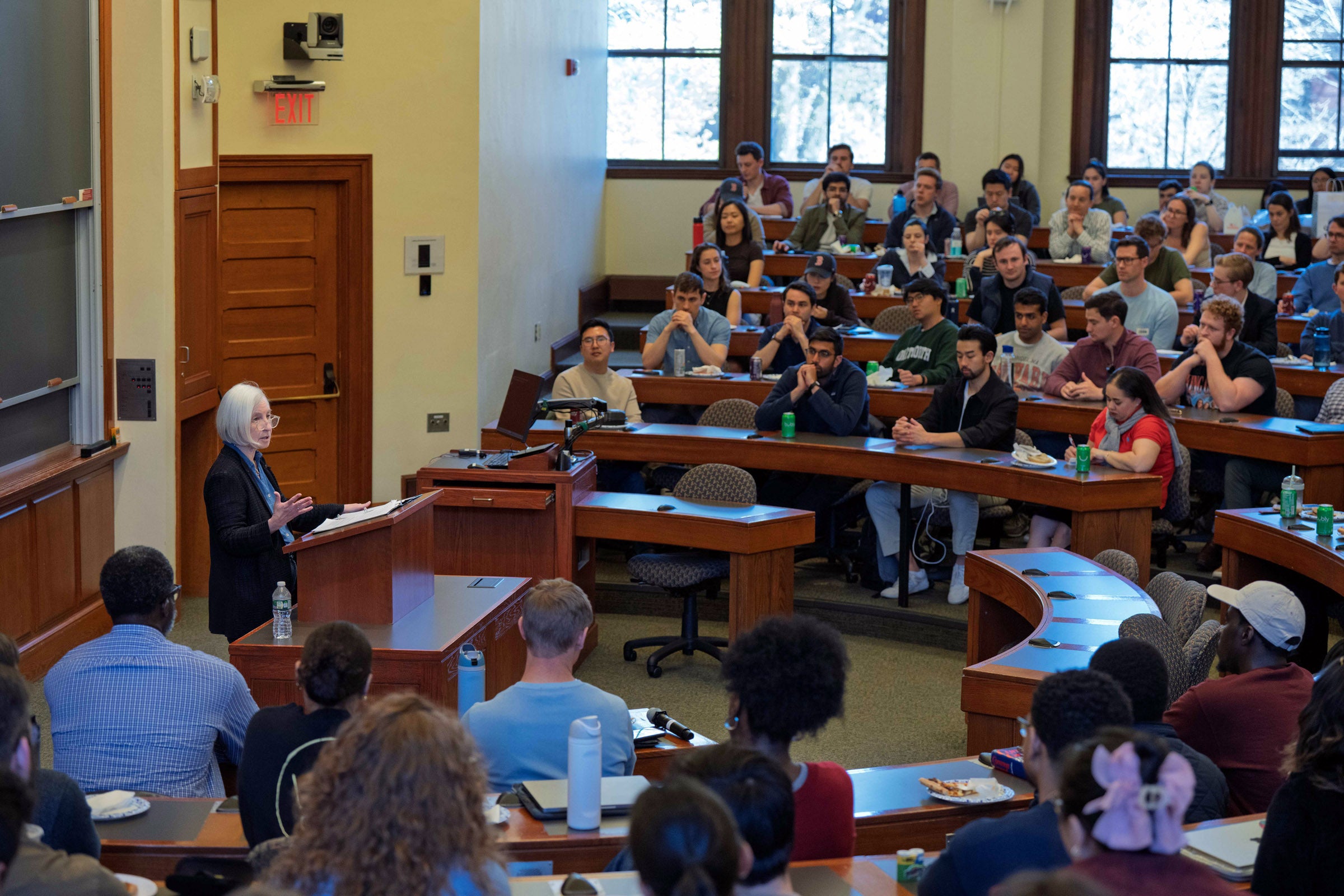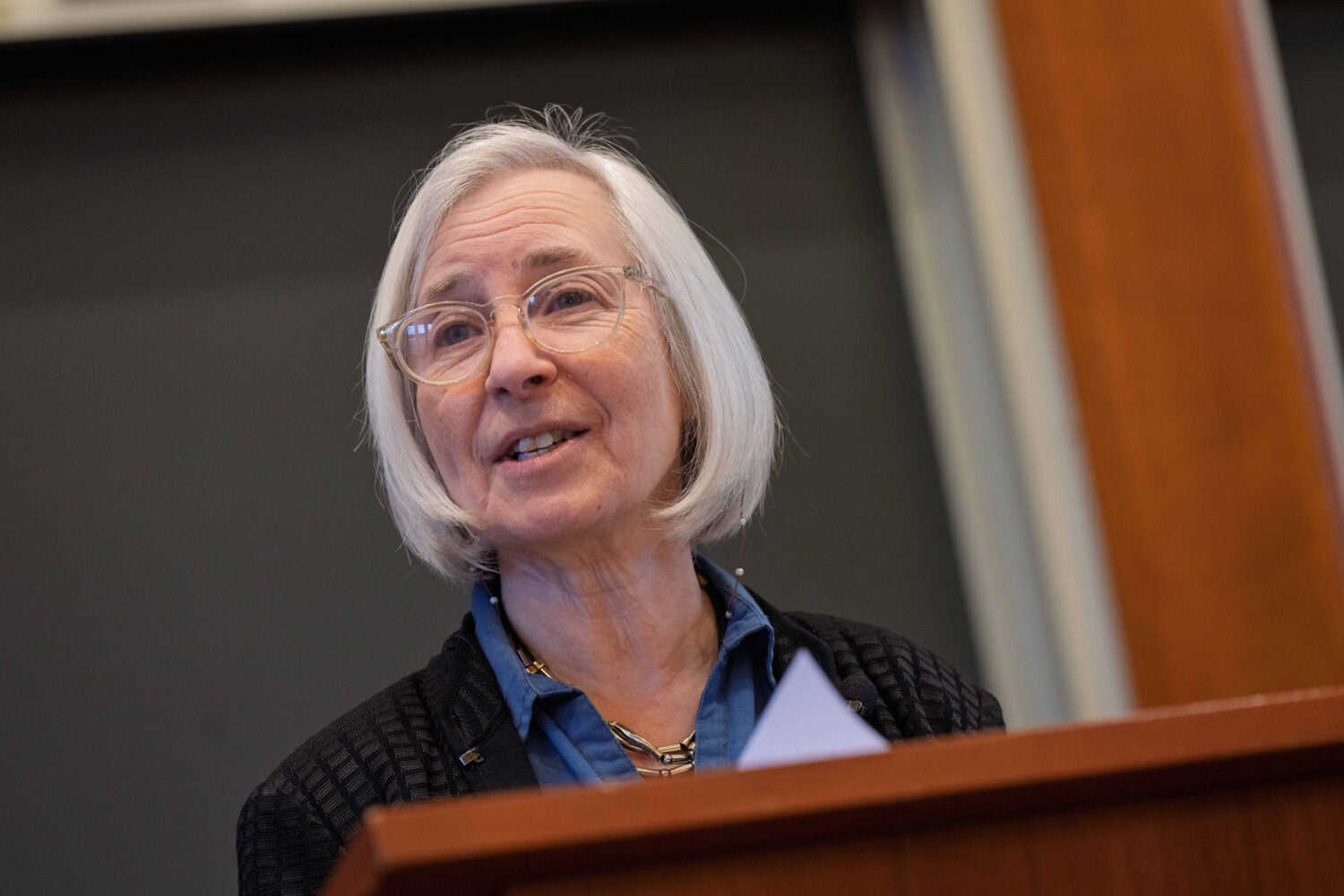In opening her Last Lecture, Martha Minow, the 300th Anniversary University Professor at Harvard University, invoked one of Harvard Law School’s most prominent dropouts, Henry James. The famed writer once said that three things in life are important: The first is to be kind, the second is to be kind, and the third is to be kind.
Minow was one of four professors chosen by class marshals to impart wisdom and advice in a Last Lecture to the graduating Class of 2025. Having delivered two such lectures in previous years, Minow chose this time to explore the benefits of kindness — spiritual, scientific, and professional.
Minow, a former dean of the law school, expanded on James’s advice by giving three of her own reasons to embrace kindness, saying, “First, it will come back to you, kindness in return, if not directly then triggering kindness in response. Second, it will make you feel good, and actually, as people at the Harvard Medical School have now documented, kindness has benefits to physical and mental health. And third, kindness can build the world you want to live in.”
“It might seem like a passive virtue, but in reality kindness is an active force that can confront hate and injustice.”
That first point prompted a memory of her own early job in the newspaper business. “I was the lowest of the lowest. I was a copy clerk,” she said. “My job was basically to do what anybody asked. I was a gopher.’”
It was a great day if she didn’t get yelled at too much, she recalled, yet there was one reporter who bothered to ask her name and start friendly conversations. “It made me kinder to even the meanest person in the room — the columnist who barked orders, and I remember his name too. Remembering this experience continues to influence how I try to be in the world.”
She named Liberty Kenneally, whom she hired as senior executive assistant, as someone who embodies those values. “If Harvard Law School is a kinder, gentler place than you see in the movies, she’s a lot of the reason.”
Kindness to others, she added, can even make you happier than getting a higher salary. “I know you don’t believe that, but that’s what the research shows,” she said. “We need to remind ourselves about the importance of kindness, especially as lawyers.”

While kindness may seem somewhat out of place in a competitive legal environment, she cited studies showing that a kinder workplace results in a more productive, more satisfied one. The idea that “civility is contagious” was confirmed, she said, in a recent Harvard Business Review article that said treating people well makes them more inclined to work for you. She quoted her lawyer sister Nell and the poet Maya Angelou, who both said kindness takes you out of your own head and further into the world. “So practically, be kind because it can make the difference in a job hunt and a career.”
Minow noted that the nation’s current political and social climate doesn’t generally promote kindness. Indeed, she listed a number of words — Black, diversity, underappreciated, victim, women — that might cause the federal government to “yank” funding if she used them. That reaction, she said, only makes kindness more imperative. “It might seem like a passive virtue, but in reality kindness is an active force that can confront hate and injustice. Choosing kindness in a time of heightened division is a radical act; it asserts that every human being is worthy of dignity and respect.”
Yet, she said, “We are living in a time of massive unkindness — of bullying, fear of it, and worse.” This, she added, was underlined by recent headlines about the inhumane treatment of immigrant detainees. “Cruelty too often is not a bug but a feature of contemporary public policy. It can come from individuals who are defending their egos, who are mentally unable to cope, who accept human suffering as unavoidable collateral damage — or, even, who gain pleasure from the distress of others.
“I am not naive enough to think that smiles and holding doors open will fix our world. But I am convinced by the neuroscientist Abhijit Naskar who says, ‘Humanity begins with admitting inhumanity.’ ”

View full coverage from the festivities of the 2025 Class Day and Commencement Ceremonies at Harvard Law School
Want to stay up to date with Harvard Law Today? Sign up for our weekly newsletter.
